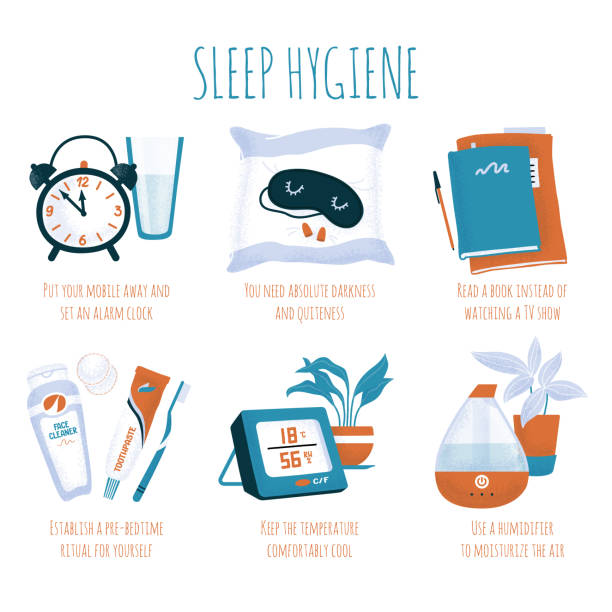Why sleep is important:
Why sleep is so important? Quality sleep is vital for both physical and mental health, yet many people struggle with getting enough restful sleep. Often, people ignore the importance of good sleep hygiene. However, taking proper sleep hygiene practices can significantly increase the quality of your sleep, improve your mood, and boost your overall well-being. In this blog, we will take a look at why sleep hygiene is so important and provide practical tips for improving your sleep habits. So, whether you’re looking to sleep better, reduce stress, or improve your health, following these strategies can make a big difference.
What Is Sleep Hygiene?

Sleep hygiene refers to the habits, practices, and environmental factors that help promote better sleep. More importantly, practicing good sleep hygiene ensures that your sleep is constant and healthful. Proper sleep hygiene habits can help you fall asleep faster, enjoy deep, refreshing sleep, and wake up feeling more refreshed. By making a few simple adjustments to your daily routine and sleep environment, you can enhance your sleep quality and improve your health over time.
Benefits of Good Sleep Hygiene
Maintaining good sleep hygiene can offer several health benefits, both mental and physical. When you get sufficient, quality sleep, your body is better provided to handle stress, fight infections, and recover from daily activities. However, without enough rest, your brain function, emotional balance, and immune system may suffer. Poor sleep hygiene can lead to memory issues, reduced concentration, and even increase the risk of chronic diseases like heart disease, diabetes, and obesity.
Sleep for brain functions:

Good sleep is necessary for proper brain function. During sleep, your brain store memories, clears out toxins, and processes emotions. Moreover, refreshing sleep helps regulate mood, promotes healthy skin, and supports metabolic health. So, building healthy sleep habits into your daily routine can significantly improve your energy levels and overall quality of life.
Practical Tips for Improving Sleep Hygiene
Now that you understand the importance of sleep hygiene, let’s take a look at some fruitful tips to improve your sleep habits. Incorporating these strategies into your routine will help you achieve better, more fresh sleep.
1:Stick to a Regular Sleep Schedule
One of the most effective ways to improve your sleep hygiene is to establish and maintain a regular sleep schedule. Going to bed and waking up at the same time every day helps regulate your body’s internal clock. This regularity makes it easier for your body to fall asleep naturally at night and wake up refreshed in the morning. Even on weekends, try to keep your sleep schedule consistent to avoid disrupting your sleep-wake cycle.
2:Create a Sleep-Friendly Environment

Your sleep environment plays a vital role in the quality of your sleep. A comfortable, quiet, and dark room can make all the difference. To enhance your environment, start by ensuring that your bedroom is cool and free from distractions. A comfortable mattress and pillows are essential for good sleep. Moreover, consider using blackout curtains to block out external light and reduce noise using earplugs or a white noise machine. By creating a peaceful, sleep-friendly atmosphere, you’ll improve your chances of falling and staying asleep.
3:Avoid Stimulants and Heavy Meals Before Bed
Certain substances can disturb your ability to fall asleep, so it’s essential to avoid stimulants in the evening. Caffeine, nicotine, and heavy meals should be avoided in the hours leading up to bedtime. Caffeine and nicotine are stimulants that can interfere with your body’s natural ability to wind down. Similarly, heavy meals can cause irritation and acidity, making it harder for you to fall asleep. However, light snacks such as a banana or a small serving of yogurt can be consumed if you’re a bit hungry before bed.
4:Incorporate relaxation techniques:
Stress and anxiety can significantly impact your ability to fall asleep, so incorporating relaxation techniques into your bedtime routine can make a big difference. Activities such as deep breathing, progressive muscle relaxation, or meditation can help calm your mind and prepare your body for sleep. In fact, these relaxation techniques reduce cortisol levels, promoting a sense of calmness that encourages sleep. Journaling or reading a book can also be a relaxing way to end your day and help transition into sleep.
5:Limit Screen Time Before Bed
Many people struggle to sleep because of the blue light emitted by phones, tablets, and computers. This light interferes with melatonin production, a hormone that regulates sleep. As a result, it’s best to avoid screen time at least 30 minutes before bed. Instead, try reading a book or listening to calming music to unwind. More so, if you can, try to create a wind-down routine that signals to your brain that it’s time to sleep.
The Role of Diet and Exercise in Sleep Hygiene

Your diet and physical activity levels can also effect your sleep quality. A well-balanced diet that includes plenty of fruits, vegetables, and whole grains can support your overall health and sleep patterns. On the other hand, a diet high in sugar or processed foods may negatively affect your sleep quality.
Exercise is another important factor in sleep hygiene. Regular physical activity promotes deep sleep and helps regulate the sleep-wake cycle. However, it’s important not to engage in acute exercise right before bed, as this may leave you feeling too energized to sleep. Aim to finish any healthy exercise at least a few hours before bedtime.
Managing Stress for Better Sleep
Chronic stress is one of the leading causes of poor sleep quality. By managing your stress levels successfully, you can improve both the quantity and quality of your sleep. Techniques such as mindfulness meditation, yoga, and talking to a therapist can help reduce stress. Moreover, taking breaks during the day to relax and unwind can also prevent stress from accumulating, making it easier to sleep at night.
Conclusion
In conclusion, sleep hygiene is an essential component of a healthy lifestyle. By adopting healthy sleep practices, you can enjoy better sleep, improved health, and enhanced well-being. Following a regular sleep schedule, creating a relaxing sleep environment, avoiding stimulants before bed, and managing stress can help you achieve the restful, rejuvenating sleep your body needs.
So, if you’re ready to make a change, prioritize sleep hygiene in your daily routine. By doing so, you’ll feel more energetic, focused, and ready to take on the challenges of each day. Remember, quality sleep is the foundation of a healthy life.
